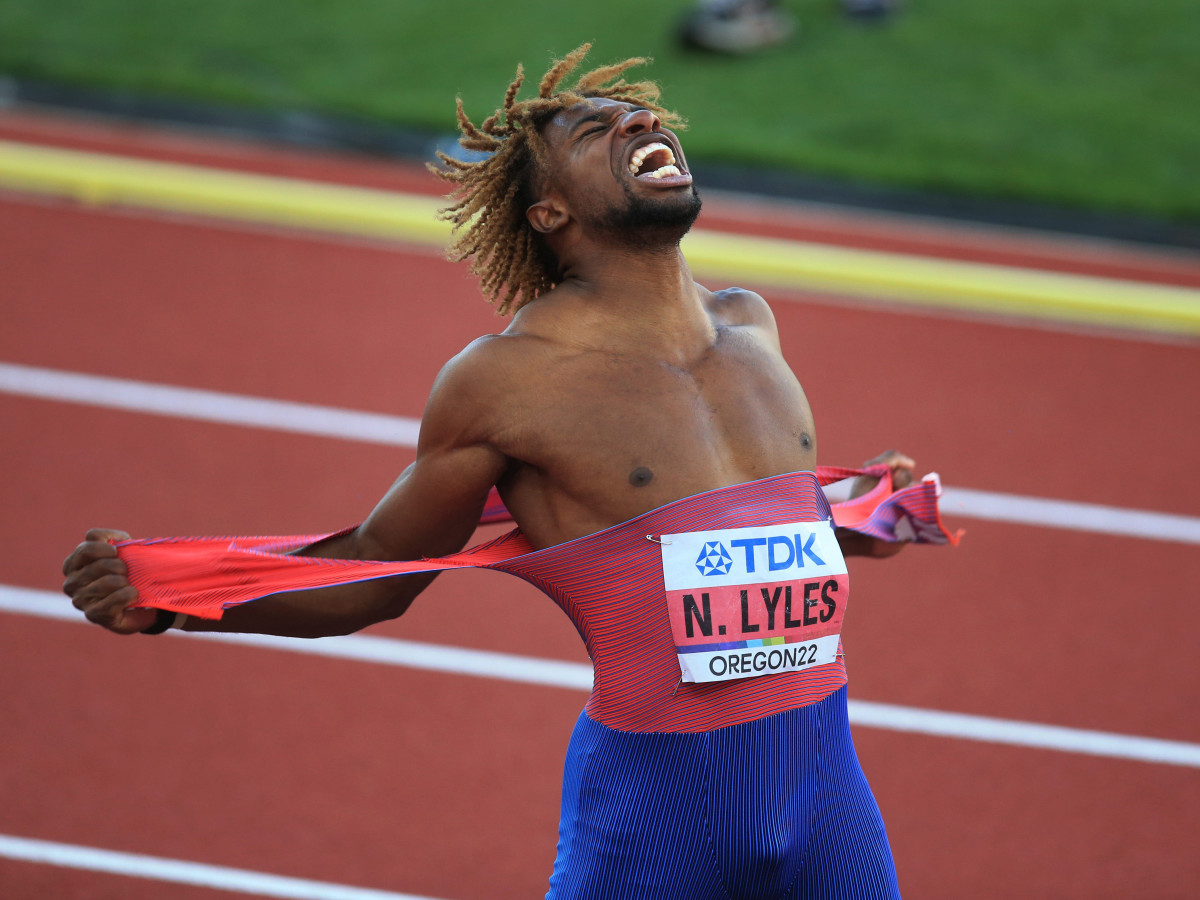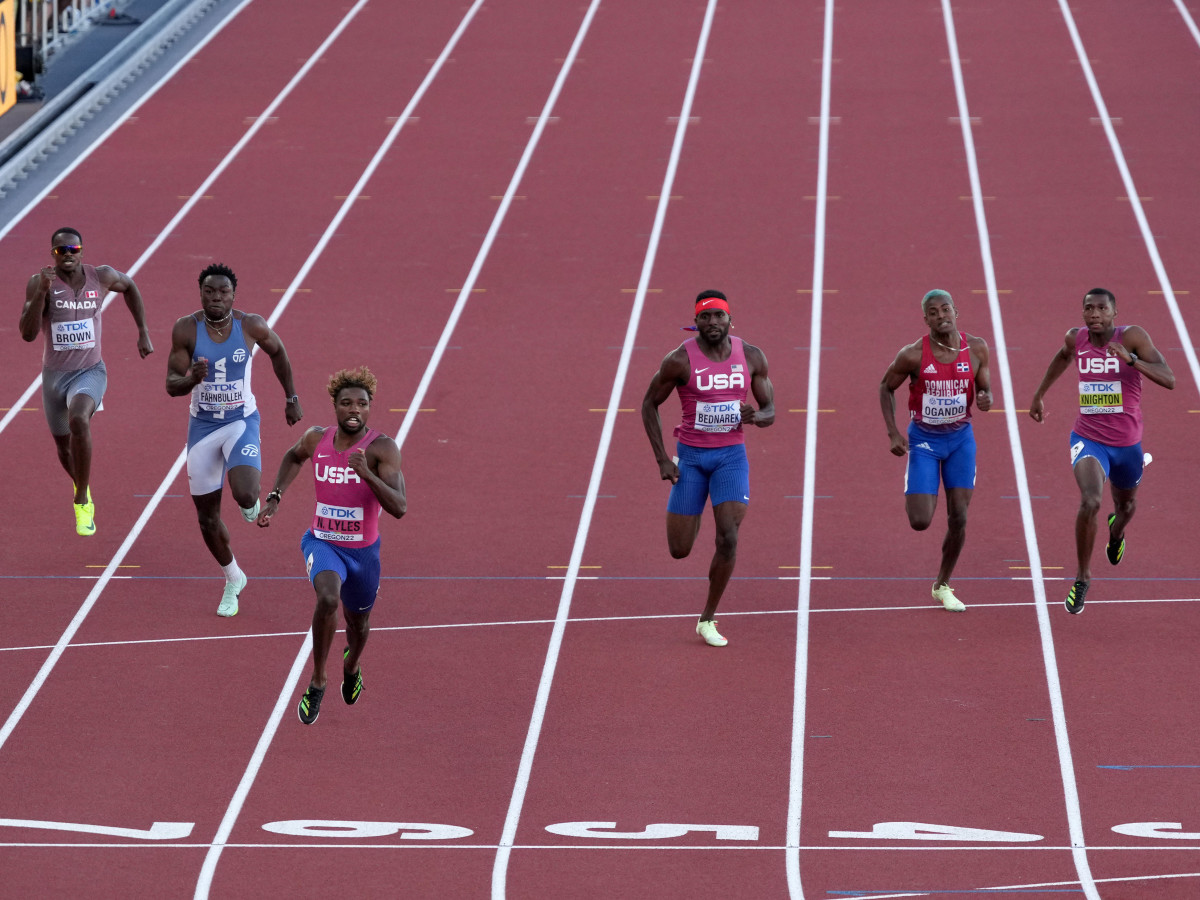Noah Lyles Put on the Performance of a Lifetime to Become the Fastest Man in the U.S.

EUGENE, Ore. — Noah Lyles turned 25 on Monday, and to celebrate, he did … absolutely nothing. He had already dominated his heat in the 200-meter dash, before retreating to the Airbnb his family rented for the world championships to eat dinner and undergo two hours of treatment. Then he sped back to the U.S. national team’s hotel and went to sleep. No cake. No candles. Only the gold medal he wanted so desperately to win.
Lyles was that focused. So much so, that when he went to Hayward Field for Tuesday’s semifinals, he forgot his cell phone. As his mother, Keisha Caine Bishop, dropped it off, she considered these signs positive, more proof of a 360-day, 180-degree transformation.

The celebration would take place Thursday night instead, after the 200-meter final, in front of a crowd that stood, so many necks craning, to see what a sprinter who embodies exuberance had in mind. Lyles did not disappoint. He raised both arms skyward. He posed, hands on hips. He flexed. He waved. He ran toward the stands and embraced his family, then lingered in front of the photographers, primed for another close-up.
Soon, he stopped in front of the clock, the one that read 19.32, as in seconds. He paused, incredulous, and then after a beat that felt like a lifetime, the final number changed. 19.31. And, right then, he ripped his track singlet down the middle. History, after everything, after the mental health struggles, after Tokyo, was his.
Lyles’s time was .01 faster than the 26-year-old U.S. record, set by sprint legend Michael Johnson at the Atlanta Olympics. It was the third-fastest 200 ever run. It was .19 ahead of his own previous personal best. It was so fast that Lyles admitted he broke form, a rarity. So fast, in fact, that he didn’t know at first who finished second (countryman Kenneth Bednarek), and only learned who came in third (young U.S. phenom Erriyon Knighton, for the sweep) as he climbed the podium for the medal ceremony. Such was the space between him and the rest of the field.
A television camera zoomed in on a tattoo near his waistline. ICON, it read, one word summarizing both his future and the last year in his life.
This race, perhaps the most anticipated of the first world championships held in the United States, had been billed as the latest installation of an enticing rivalry, at once held on a world stage and home soil. Knighton vs. Lyles. Youth against experience. “Everybody loves it,” Bishop says Tuesday, beckoning the challenge that awaited her son. “Noah came here to compete.”

The combatants are friends when they’re not racing. They’re both sponsored by Adidas and acutely aware of the crucible—unfathomable success while teenagers, attendant pressure, growing celebrity, stress, fame—they compete in. Lyles was Knighton when Knighton still envisioned an NFL career and entertained scholarship offers from the likes of Alabama, before pivoting fully into track. Knighton is Lyles, before everything.
Don’t mistake their bond for perpetual bliss, though. Both want to win more than they want that friendship. Case in point: their 200 final at the U.S. championships a few weeks back.
First, some context: After Lyles won the bronze medal in Tokyo (pushing Knighton down to fourth), Knighton edged Lyles’s best 200 time by .01 this past April. Since Knighton had already bested some of Usain Bolt’s age-group records and became the youngest male U.S. track Olympian since 1964, his 19.49, at only 18 years old, seemed to shift the conversation.
This fashioned Lyles—still just 24 at that point, accomplished and with no plans to retire any time soon—as more backup singer than lead vocalist. Longtime track and field types like Al Joyner, a triple jump gold medalist in 1984 who’s still coaching, understandably gushed over Knighton’s potential. “It seems like about every 40 years, someone like that comes along,” Joyner told Sports Illustrated this week. “He’s that fast and doesn’t have no muscles yet.” Not since Bolt himself had Joyner seen “that magic.”
Until that national championships race. Lyles opened a lead that Knighton attempted to close in the final meters. But Lyles knew better, and as he crossed the finish line first, he glanced at his rival’s lane, grinned and pointed at the scoreboard. More important than that victory was the revelation it provided. Lyles believed that he had felt Knighton’s top speed, and he liked—loved—how his compared.
“Job’s not finished,” Knighton said.
Not, it turns out, for either of them. (Lyles would later insist that the theatrics were pointed toward the many who doubted him, not Knighton.)

Regardless, that victory—and all that Lyles underwent between an Olympic finish he called “boring” and his world championships redemption—pointed toward a different sprinter who occupied the same body but moved with a joy that had gone missing during the pandemic. Lyles had struggled with depression before Tokyo. He took antidepressants that negatively impacted his training. He missed the crowds that once fed him energy via cheers. He hated not having his family at his races. He was a performer without an audience, and without an audience, his performance, while still elite, dipped.
When Lyles returned home with the bronze, his mother sensed resolve more than anything. He didn’t seem that downtrodden. Gone were the tears he shed that night in Tokyo. Meanwhile, if Bishop even heard the Olympic anthem, she turned it off. Noah went to therapy. He spoke about his mental health struggles and the resources available, and he did so with his family, which operates The Lyles Brothers Sports Foundation.
This work, on both himself and for others, lifted Lyles into a different headspace. Epiphanies soon followed. One happened this winter in New York City, at the Millrose Games, which seemed pointless until he spied a tweet from the man who once wore golden spikes. Michael Johnson, who had written something like “people don’t go to races to watch people run; they go because they enjoy watching you run.” That spoke to Lyles, the performer, whose therapist soon after reminded him that his best performances were performative.
The entertainer showed up in Eugene. His brother, the sprinter Josephus, made the team. His family traveled into town, as did the enthusiastic crowds that flocked to Hayward Field. The contrast in the setting made for the contrast in the man. Lyles, it seems, had been more affected by the atmosphere in Tokyo than his competitors. So of course, it made sense that the drastically different setting energized him more as well. “You could just tell,” his mom says, and, while she was referring to herself, everyone who watched him run here could see the exact same thing.
In Eugene, Lyles again advocated for mental health resources and support. But he also showed what courage, strength and fortitude look like on the track. He put his hand to his ear to call for more crowd noise. He spun and screamed and flexed. He mimicked a basketball finger roll. And, while he performed for an eager audience, his performances rose in lockstep.
That 200 on his birthday rid Lyles of the jitters that remained before the competition started. The 19.62 he ran Tuesday marked the second-fastest semifinal ever run at the world championships. After those statements, he described a “different vibe” and “more fun” and proclaimed himself the “most ‘me’ I’ve been in years.”
Still, the final—and another date with Knighton—loomed. While Lyles waited late Thursday evening, Shericka Jackson of Jamaica sped to a 21.45-second victory in the women’s 200-meter dash, as a crowd with a sizable Jamaican contingent waved flags, danced and blared so many horns that Hayward sounded like Manhattan during rush hour. Jackson set her own world championships record, portending the fireworks to come.
The track emptied. And the track filled again. Anticipation built toward crescendo. At 7:50 p.m. local time, the gun sounded, and Lyles burst out of the blocks with such speed it was as if he himself had been fired from the starting pistol. His brother told him he had run a 10.15-second 100 meters around the curve. “I found my juice,” Lyles said later.

Thus began the celebration. The U.S. contingent had registered only the second-ever medal sweep in the men’s 200, following a U.S. group that did the same in 2005. Only Bolt had ever run a faster world championship at that distance—and even he only did that once.
Johnson was in attendance, found Lyles and congratulated him. Both marveled at Knighton, who became the youngest world championships medalist ever, just graduated from high school and will be just fine moving forward, still on that Bolt track.
Shortly after 8 p.m., the Americans climbed atop the medal stand. At that point, and only at that point, Lyles recognized that Knighton had finished third. They wore blue warm-up jackets and matching smiles, while the sun set and an era—of young, charismatic U.S. track stars—dawned.
“I like the young fella, Mr. Lyles, because I looked at his career, I looked at his heart, and he’s a fighter,” track icon John Carlos had said earlier Thursday. “Mr. Lyles is going to have to do his greatest race in order to beat this young kid.”
He did, and then the performer celebrated, at which point his mom could remind him that, since most everyone in their family has an August birthday, the real revelry would come later. They had come so far. But full circle, from last summer, in Tokyo, to this summer, in Eugene? “I don’t think so,” Bishop says. “Full circle will be at the Olympics.”
Watch track and field live with fuboTV: Start a free trial today!
More World Championships Coverage:
• Eugene Is an Obvious, Yet Unlikely, First U.S. Host of the World Championships
• The Beautiful Mystique of the Hayward Field Tower
• Allyson Felix Nabs Bronze in Her Farewell Race
